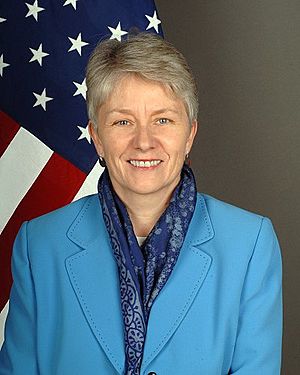Kerri-Ann Jones facts for kids
Quick facts for kids
Kerri-Ann Jones
|
|
|---|---|
 |
|
| 14th Assistant Secretary of State for Oceans and International Environmental and Scientific Affairs | |
| In office August 20, 2009 – April 25, 2014 |
|
| President | Barack Obama |
| Preceded by | Claudia A. McMurray |
| Succeeded by | Monica Medina |
| Director of the Office of Science and Technology Policy | |
|
Acting
|
|
| In office April 4, 1998 – August 3, 1998 |
|
| President | Bill Clinton |
| Preceded by | Jack Gibbons |
| Succeeded by | Neal Francis Lane |
| Personal details | |
| Born | 1954 (age 71–72) |
| Education | Columbia University (BS) Yale University (MS, PhD) |
| Scientific career | |
| Fields | Biochemistry |
| Institutions | |
| Thesis | Characterization of the response to stress in yeast (Heat shock, NMR) (1985) |
| Doctoral advisor | Robert G. Shulman |
Kerri-Ann Jones (born 1954) is a scientist and leader who has held important roles in the United States government. She served as the Assistant Secretary of State for Oceans and International Environmental and Scientific Affairs at the U.S. State Department. This means she helped guide how America works with other countries on science, environment, and ocean issues. President Barack Obama chose her for this job in 2009. Before that, she was a vice president at The Pew Charitable Trusts, a group that supports research and public projects.
About Kerri-Ann Jones
Her Education and Early Research
Kerri-Ann Jones earned her first college degree in chemistry from Barnard College at Columbia University in 1975. After graduating, she worked as a research assistant at Rockefeller University. There, she studied immunology, which is about how our bodies fight off sickness.
Later, she went to Yale University. In 1985, she earned her PhD in Molecular Biophysics and Biochemistry. For her studies, she used a special method called nuclear magnetic resonance. She used it to learn how living things react to stress and how it affects their bodies.
Her Work and Public Service
In 1985, Kerri-Ann Jones received a special fellowship. This allowed her to work with the U.S. Agency for International Development (USAID). USAID is a government group that helps other countries. She then spent a year in New Delhi, India, as an advisor on biotechnology.
When she returned to the United States, she worked for the National Institute of Health's Fogarty International Center. From 1988 to 1995, she worked again at USAID. She managed programs related to science, technology, agriculture, health, education, and the environment. She also helped create important partnerships, like the U.S. Asia Pacific Economic Cooperation (APEC) Partnership for Education.
In 1996, President of the United States Bill Clinton asked Jones to join the Office of Science and Technology Policy. This office advises the President on science and technology. She held this role until 1999. She also worked with the United States National Security Council, helping with science and technology issues that affect national safety.
Later, in 2000, she became the state director for Maine's EPSCOR program. This program helps states improve their research. In 2002, she moved to the National Science Foundation (NSF). The NSF supports scientific research and education. She led the Office of International Science and Engineering there until 2005. After that, she worked as an independent consultant.
As Assistant Secretary of State, Jones also helped lead the U.S.-Ireland R&D Partnership. This group works to improve research and development between the two countries.
 | Kyle Baker |
 | Joseph Yoakum |
 | Laura Wheeler Waring |
 | Henry Ossawa Tanner |

